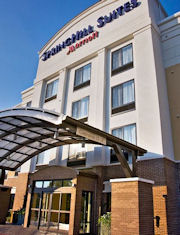by James A. Bacon
Henrico County officials doubled down last night on their claim that a 4% meals tax would be paid largely by out-of-state residents. Previously, they had contended that 40% of the tax would be paid by non-resident workers and visitors to the county. Now, in light of new data provided by Richmond Region Tourism, they estimate that 50% of the tax would be paid by outsiders.
Speaking at a public forum hosted by Tuckahoe Supervisor Patricia O’Bannon, county administrators also insisted that, despite surging prices in home sales this year, the assessed value of county real estate will not increase more than 2% this year or for the foreseeable future. The home sales, they said, are concentrated in neighborhoods that do not reflect what is happening across the county, where foreclosures are still a problem. The county still forecasts a $100 million revenue gap over the next five years.
Despite a state law clearly stating that information on referenda provided by local government must be “neutral,” County Manager John Vithoulkas and Budget Director Brandon Hinton made a severely one-sided presentation in support of the proposed meals tax, which citizens will vote on in November. No pros and cons — just pros.
In opening remarks, Hinton said, “We are bound by the law to state the facts. It’s your decision.” But, when pressed by your humble correspondent on the use of cherry picked data to support the county’s position, Vithoulkas justified the administration’s aggressive promotion of the tax on the grounds that Virginia courts had interpreted the law to allow government officials broad latitude to explain how they had reached their decision.
Give the pro-meals tax officials credit for this: After dozens of public hearings, they have refined their pitch. While they still say they will dedicate the estimated $18 million in revenue from the meals tax to schools, they no longer liken the arrangement to a “lockbox.” They also have strengthened their claim that much of the tax would be paid by non-residents.
Sidney Gunst and Mike Mickel, both outspoken critics of the tax, challenged the use of the “lockbox” term last night. While the Board of Supervisors can guarantee that the $18 million in meals-tax revenue will flow into the school budget, they argued, there is no provision to guide the rest of the money the county spends on schools. There is no legal mechanism to stop the Board from adjusting the other half billion dollars it allocates to schools downward, if it pleases.
But Vithoulkas and Hinton had dropped the “lockbox” term from their remarks last night. And Supervisor O’Bannon, who supports the meals tax, made little effort to defend the use of the term. Instead, she vowed that she personally would vote to uphold the promise to the schools. In essence, they beat a tactical retreat from an untenable position.
The county unquestionably scored points with a presentation by Jack Berry, president of Richmond Region Tourism. Henrico does not have a reputation as a major travel destination but it does, in fact, generate the fifth largest number of visitors of any jurisdiction in Virginia — 2.5 million yearly, just behind Virginia Beach and ahead of Williamsburg. Travelers on two Interstates drive through the county, the Richmond regional airport is located in the county and the region’s biggest sports event, NASCAR at the Richmond Raceway, takes place in the county. Henrico also has 9,000 hotel rooms, more than the City of Richmond and Chesterfield County combined.
When 10,000 visitors attended an Amway convention at the downtown Greater Richmond Convention Center last weekend, Berry said, more than half stayed in Henrico hotels. Also, Henrico generates a disproportionate share of the region’s business travel and it brings in thousands of visitors for amateur athletic events. Visitors spent an an average of $45 per day on meals. Right now, he said, those visitors are not paying a tax when they dine in Henrico restaurants.
While county officials gave lip service to wanting a dialogue about the meals tax — “the time is right to have the conversation and decide,” Vithoulkas said — little actual dialogue was permitted. The handful of skeptics were politely cut off after two or three minutes of repartee, while a teacher pleading for more money for schools was allowed to discourse at length. As soon as everyone in attendance who wanted to ask a question had a chance to ask one, the “forum” (dictionary definition, a meeting place for the discussion of questions of public interest) was adjourned a few minutes after 8:00 p.m., having lasted little more than an hour.



